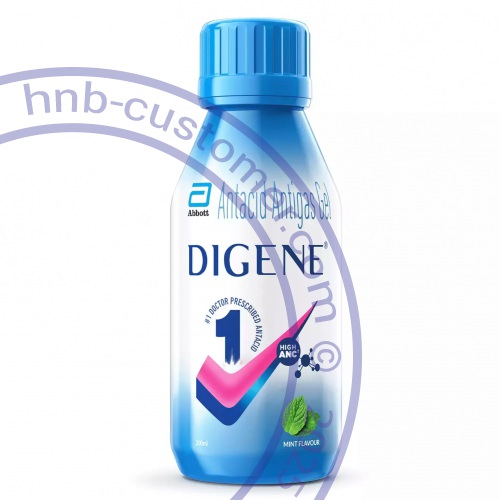Digene® Gel
What is this medicine?
Digene Gel belongs to a group of medicines called 'antacids' used to treat acidity, heartburn, indigestion, gastritis (inflammation of the stomach), and stomach upset. The stomach is usually protected from the acid by a mucous layer. In some cases, the mucous layer gets eroded due to excess acid production, which leads to complications like acidity and heartburn. Digene Gel is a combination of four drugs: aluminium hydroxide, magnesium hydroxide, simethicone, and sodium carboxymethylcellulose. Its scientifically developed combination of active ingredients provides a high acid-neutralizing capacity property. Thus, it provides relief from acidity and gas whenever acidity strikes. It is a sugar-free syrup that provides effective action against acidity, reduces stomach pain, and protects the stomach from making excess acid for long-lasting relief.
What should I tell my health care provider before I take this medicine?
Inform your doctor before taking Digene Gel if you have low phosphate levels, high magnesium levels, kidney or liver problems. Consult your doctor before taking Digene Gel if you are pregnant or breastfeeding. Digene Gel should not be given to children as safety has not been established. Avoid consuming alcohol along with Digene Gel as it could lead to increased acidity.
How should I use this medicine?
Take Digene Gel with or without food. Take the required dose/quantity of Digene Gel using the measuring cup provided by the pack; shake the bottle well before each use. You are advised to take Digene Gel for as long as your doctor has advised it for you, depending on your medical condition. In some cases, you may experience certain common side-effects such as constipation, loss of appetite, weakness, and diarrhoea. Most of these side effects do not require medical attention and will resolve gradually over time. However, you are advised to talk to your doctor if you experience these side effects persistently.
What may or may not interact with this medicine? Any cautions?
Tell your doctor about all medicines you use, and those you start or stop using during your treatment.
- Digene Gel may have interaction with pain killers (aspirin), antibiotics (doxycycline, oxytetracycline, levofloxacin, azithromycin, ciprofloxacin), anti-asthma (albuterol, ipratropium), anti-diabetic (glipizide), and vitamins (ascorbic acid, ergocalciferol, cholecalciferol).
- Avoid taking citrates along with Digene Gel as it might lead to increased serum levels of aluminium. Avoid alcohol intake as it leads to increased production of stomach acid, thereby increases acidity and heartburn.
- Consult your doctor before taking Digene Gel your doctor will decide whether Digene Gel can be taken by breastfeeding mothers or not.
- Digene Antacid Antigas Gel to be taken with caution, especially if you are children below the age of 12. Your physician may adjust your dose depending upon your age. Please consult the physician.
- Consult your physician before taking Digene Antacid Antigas Gel if you have kidney impairment or any concerns regarding this. Your physician will weigh the benefits and any potential risks before recommending them to you.
- Consult your physician before taking Digene Antacid Antigas Gel if you have a liver impairment or any concerns regarding this. Your physician will weigh the benefits and any potential risks before recommending them to you.
- It is not known if Digene Antacid Antigas Gel affects your ability to drive. Drive or operate machinery only if you are alert.
- Consult your physician before taking Digene Antacid Antigas Gel; your physician will decide whether Digene Antacid Antigas Gel can be taken by breastfeeding mothers or not.
- Please consult your physician before taking Digene Antacid Antigas Gel if you are pregnant. Your physician will suggest only if the benefits outweigh the risks.
- Avoid consumption of alcohol while taking Digene Gel Alcohol intake leads to increased production of stomach acid, thereby increases acidity and heartburn.
What should I watch for while using this medicine?
Do not take Digene Gel if you are allergic to any of its contents, debilitated (very weak), if you have kidney problems, and severe stomach pain partially or fully blocked bowel. Inform your doctor before taking Digene Gel if you have low phosphate levels, high magnesium levels, kidney or liver problems if you are on a low-phosphate diet. Consult your doctor before taking Digene Gel if you are pregnant or breastfeeding. Digene Gel should not be given to children as safety have not been established. Avoid consuming alcohol along with Digene Gel as it could lead to increased acidity.
What side effects may I notice from this medicine?
In some cases, you may experience certain common side-effects such as constipation, loss of appetite, weakness, and diarrhoea. Most of these side effects do not require medical attention and will resolve gradually over time. However, you are advised to talk to your doctor if you experience these side effects persistently.
Common side effects
- Constipation
- Diarrhea
- Loss of appetite
- Weakness
Where should I keep my medicine?
Store in a cool and dry place away from sunlight. Keep this medicine in the packet or the container it came in, tightly closed. Make sure it is not consumed by pets, children and other people.





